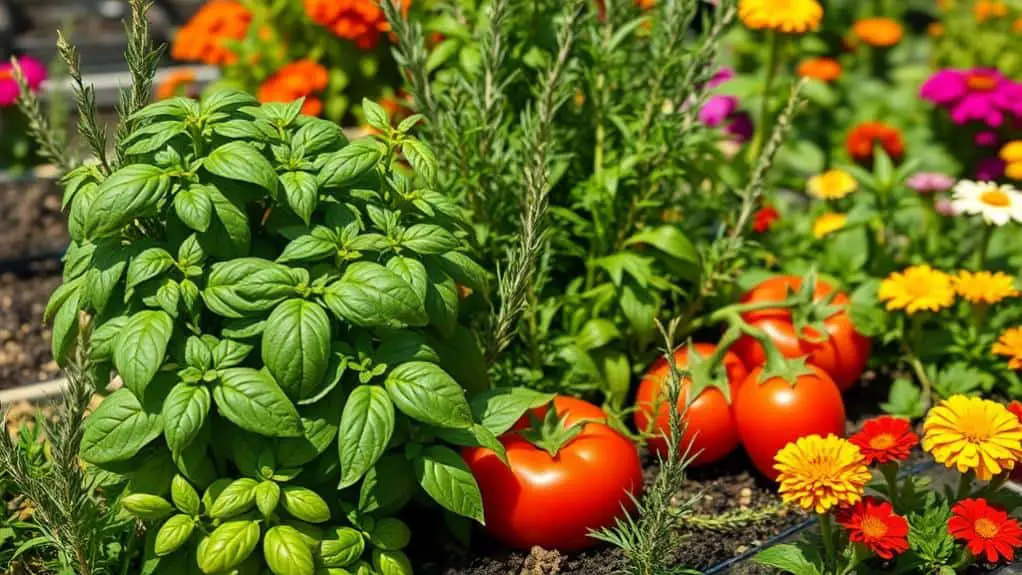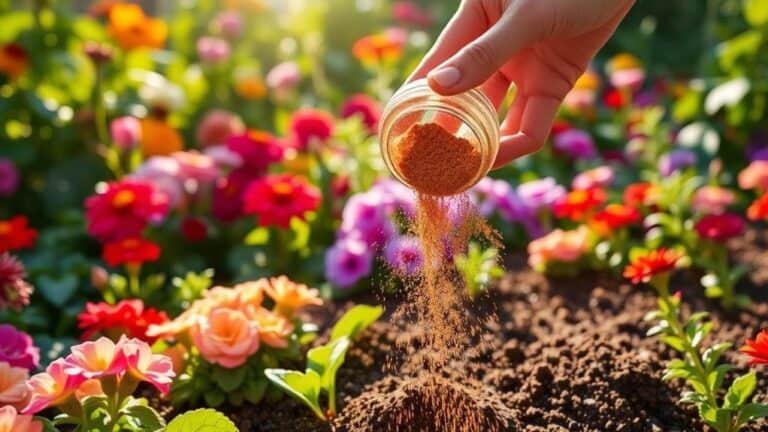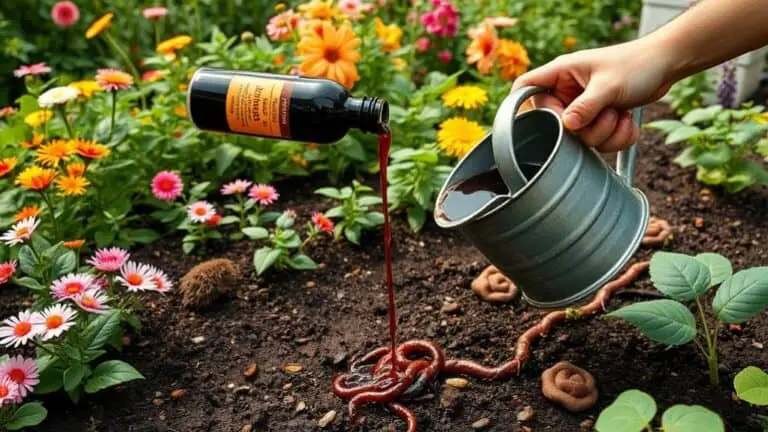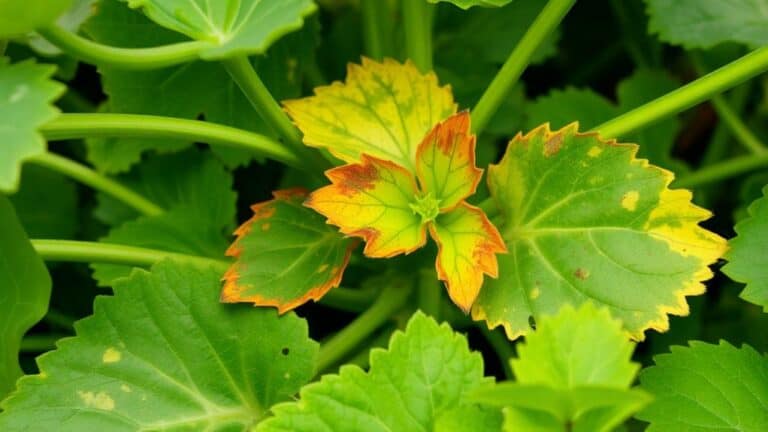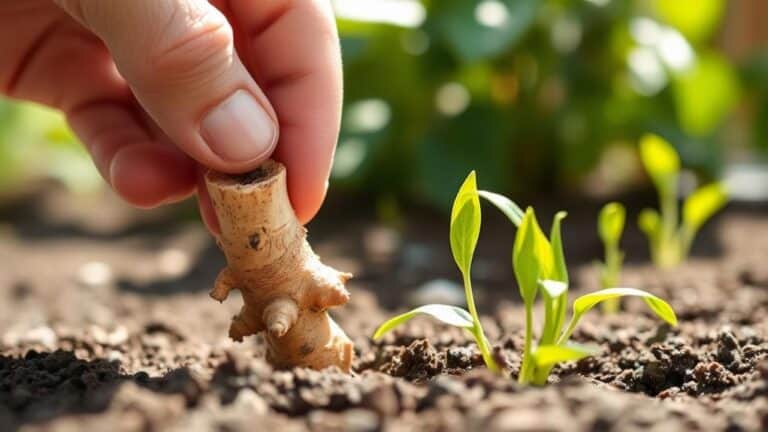Herbs You Should Always Plant Side By Side
When planning your herb garden, it's essential to contemplate which herbs thrive when planted together. For instance, pairing basil with tomatoes can enhance flavor and keep pests at bay, while chives and carrots make a great team by improving taste and deterring harmful insects. But did you know that some herbs, when placed side by side, can actually hinder each other's growth? Understanding these dynamics can greatly impact your garden's productivity. Stick around, and we'll explore the best combinations and what to avoid for a vibrant, thriving herb garden.
Companion Planting Basics
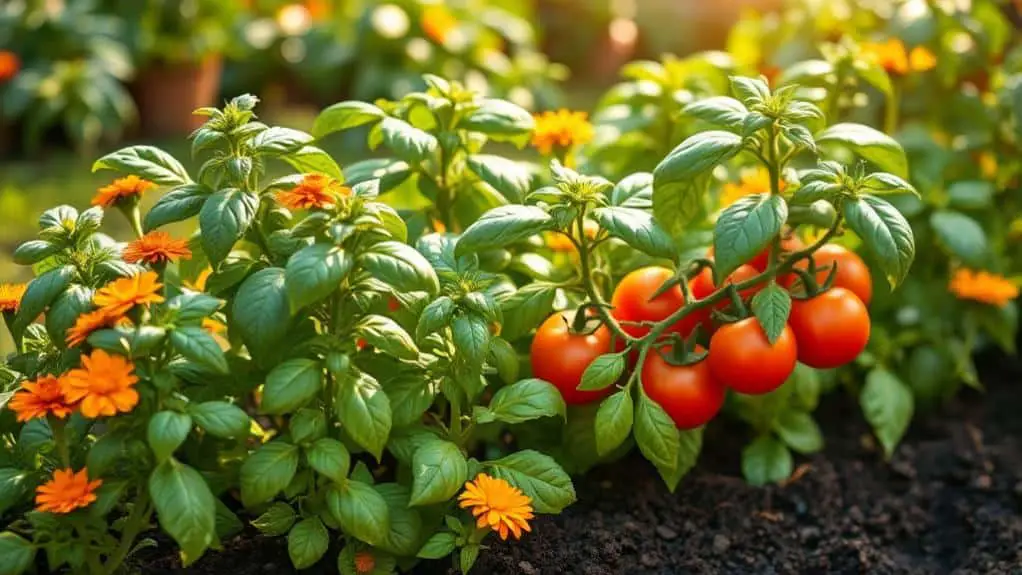
Companion planting isn't just a gardening trend; it's crucial to a time-tested practice that can make a world of difference in your herb garden. By strategically placing herbs to plant together, you can boost their growth and keep pests at bay.
For instance, basil, parsley, and chives thrive when grown together, thanks to their similar needs and pest-repelling properties. It's important to understand compatibility, ensuring herbs share growth rates and environmental preferences.
Avoid pairing aggressive growers like mint with other herbs, as it can dominate and stunt their growth. Companion planting creates a harmonious garden ecosystem, making your herbs healthier and more robust.
Benefits of Planting Together
When you plant herbs together, it's amazing how they can help each other thrive!
For example, pairing basil with tomatoes not only tastes great but also keeps pests away, reducing the need for chemicals.
Plus, herbs like chives can improve soil health and attract helpful insects, making your garden even more vibrant and productive.
Enhanced Pest Control
Pairing herbs strategically in your garden can be a game-changer for pest control. By using companion planting, you can protect your plants while fostering a healthy ecosystem.
For instance, planting basil with tomatoes not only repels aphids but also boosts tomato growth. Dill attracts beneficial insects like ladybugs and tachinid flies, which keep harmful pests in check. Strong-scented herbs such as mint can disguise the scents of more vulnerable plants, confusing pests.
- Basil repels aphids, enhancing tomato growth.
- Dill draws in beneficial insects like ladybugs.
- Mint masks scents, deterring pests.
- Chives deter carrot flies and promote carrot health.
Companion planting with herbs creates a natural defense system, making your garden both healthier and more productive.
Improved Soil Health
Planting herbs together can do wonders for your garden's soil health. By practicing companion planting, you promote biodiversity, which enriches soil structure and nutrient availability.
For instance, herbs like basil and parsley have root systems that boost microbial activity and nutrient cycling. Pairing herbs with legumes, such as clover, can naturally fix nitrogen in the soil, providing essential nutrients for neighboring plants.
A diverse herb garden also helps reduce soil erosion; the varied root networks stabilize the soil effectively. Additionally, companion planting attracts beneficial insects, which aid in the decomposition of organic matter, further enhancing nutrient availability.
Ideal Growing Conditions
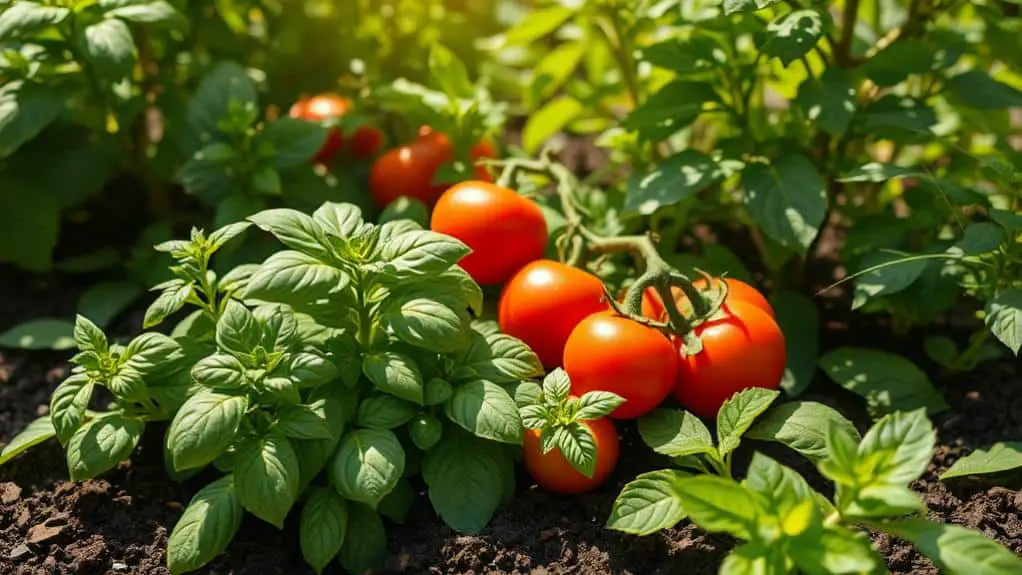
When you're planting herbs together, it's super important to match their sunlight and soil needs.
For example, Mediterranean herbs like rosemary and thyme love full sun and well-drained soil, while others like basil and mint need moist soil and frequent watering.
Sunlight and Soil Needs
Understanding the ideal growing conditions for your herbs guarantees they thrive and flourish in your garden. Knowing the sunlight and soil needs of your herbs is essential for successful companion planting.
For instance, many Mediterranean herbs like rosemary, thyme, and oregano love full sunlight and well-draining soil. Planting them together assures they all receive the right conditions.
Meanwhile, basil and cilantro prefer warm, sunny spots but need consistently moist soil.
Consider the following when planning your herb garden:
- Rosemary, thyme, oregano: Full sunlight, well-draining soil
- Basil, cilantro: Warm, sunny conditions, moist soil
- Chives, parsley: Rich, well-drained soil, partial to full sun
- Mint: Moist soil, sunlight, best in containers to control spread
Watering and Drainage Requirements
To guarantee your herb garden thrives, it's crucial to understand the watering and drainage requirements of different herbs.
Most Mediterranean herbs like rosemary, oregano, and thyme thrive with minimal watering needs and well-draining soil. They're drought-resistant and prefer full sunlight.
On the other hand, herbs like mint and basil need moist, nutrient-rich soil, requiring frequent watering. Remember, mint should be in containers to control its spread.
Chamomile and lemon balm enjoy moderate moisture levels and well-draining soil, tolerating some shade.
Always group herbs with similar watering needs. Regularly monitor soil moisture levels; chives and parsley need consistent moisture, while sage prefers drier conditions to avoid root rot.
Understanding these needs guarantees a lush, healthy herb garden.
Mediterranean Herb Pairs
Mediterranean herb pairs like basil, oregano, and thyme thrive together because they share similar needs for sunlight and well-draining soil, making them perfect companions in any garden.
Companion planting these Mediterranean herbs enhances their growth and flavors. Here are some combinations to contemplate:
- Basil and Tomatoes: Basil boosts tomato flavor and repels pests.
- Oregano and Peppers: Oregano deters aphids and pairs well in dishes.
- Thyme and Rosemary: Both love dry conditions and full sun.
- Sage and Thyme: Ideal for dry, sunny spots, promoting strong growth.
Grouping these herbs together can lead to a more vibrant and productive garden.
Plus, you'll enjoy tastier meals with these fantastic herb combinations!
Pest-Repelling Combinations
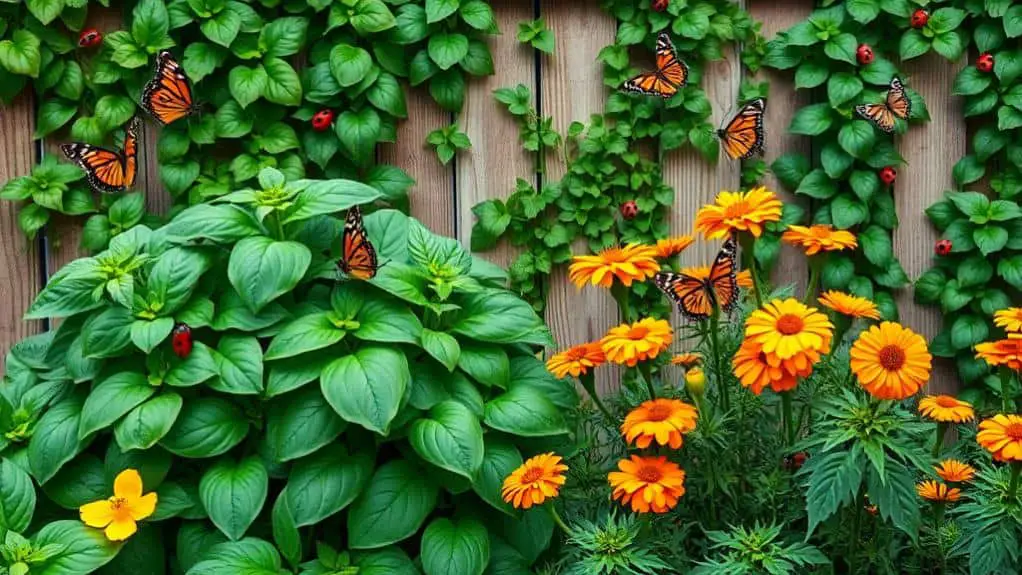
Let's talk about some awesome herb combos that keep pests away and make your garden thrive!
For example, basil repels aphids and protects tomatoes, while marigolds with their strong scent deter nematodes and help your veggies stay healthy.
Plus, rosemary can scare off cabbage moths and mint's aroma keeps ants and aphids at bay, though you'll need to keep mint contained since it spreads quickly.
Natural Pest Barriers
When it comes to gardening, natural pest barriers can be a game-changer for maintaining healthy plants.
By using companion planting, you can protect your herbs and vegetables from unwanted pests. Here are some effective combinations:
- Basil and Tomatoes: Basil enhances tomato flavor and repels aphids and whiteflies.
- Marigolds and Various Vegetables: Marigolds deter nematodes, safeguarding peppers, tomatoes, and cucumbers.
- Rosemary and Cabbage Family: Rosemary repels cabbage moths, benefiting cabbage, broccoli, and kale.
- Chives and Carrots: Chives keep carrot flies at bay, enhancing carrot growth.
These natural pest barriers not only protect your garden but also promote healthier, more robust plants.
Give companion planting a try, and watch your garden thrive!
Beneficial Insect Attraction
While natural pest barriers are a great start, attracting beneficial insects can elevate your garden's health even further.
Companion planting with herbs like dill and cilantro can bring in ladybugs and tachinid flies, which combat harmful pests. Combining lemon verbena, dill, and cilantro creates a welcoming environment for pollinators and pest predators, enhancing garden vitality.
Planting lavender, rosemary, and thyme together not only repels pests like aphids and whiteflies but also guarantees these herbs thrive.
Pairing parsley with chives attracts hoverflies, natural predators of aphids, boosting your garden's ecosystem.
The strong aroma of basil deters mosquitoes and flies, making it a great companion for other herbs and vegetables.
These beneficial pairings can markedly improve garden health.
Flavor and Growth Boost
Enhancing your garden with companion planting can greatly boost flavor and growth while keeping pests at bay.
Imagine an herb garden where basil, oregano, and thyme are growing together. These companion plants not only enrich each other's flavor profiles but also repel aphids and whiteflies, ensuring healthier plants.
Consider these effective combinations:
- Dill and cilantro: Dill attracts ladybugs, which protect cilantro from harmful pests.
- Rosemary, sage, and lavender: These herbs thrive in similar conditions and create a pest-repelling aromatic barrier.
- Parsley, chives, and sage: This trio enhances the flavor of nearby vegetables and deters slugs.
- Tarragon, lemon balm, and rosemary: Together, they improve growth rates and flavors while naturally controlling pests.
Flavor-Enhancing Duos
Pairing certain herbs together in your garden not only boosts their flavor but also offers practical benefits like pest control.
For instance, basil and tomatoes are a classic duo. Basil enhances tomato flavor and repels pests like aphids.
Another great pairing is chives and carrots; they get along well, with chives improving carrot taste while keeping aphids at bay.
Rosemary and beans make a wonderful team too. Rosemary's strong aroma keeps pests away from beans, and their flavors complement each other in dishes.
Dill and cucumbers are also perfect companions. Dill enhances cucumber flavor and attracts beneficial insects.
Herbs to Avoid Pairing
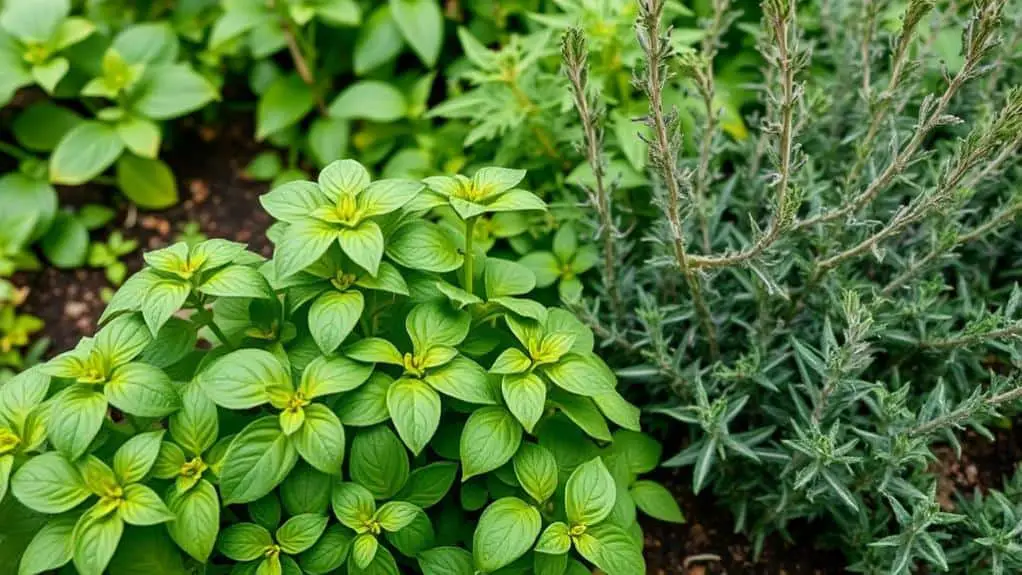
Though pairing herbs can yield fantastic results, some combinations should be avoided to prevent growth issues and flavor conflicts. Based on my experience and a reliable companion planting chart, here are a few herbs you should avoid pairing:
- Mint: This herb tends to grow aggressively, overshadowing and outcompeting its neighbors. Plant it alone or in containers.
- Fennel: It inhibits the growth of many nearby herbs, especially those in the Apiaceae family. Keep it separate.
- Rue, sage, and basil: These herbs tend to inhibit each other's growth, so avoid planting them together.
- Dill and lavender: Dill attracts pests that can harm lavender, indicating a clear incompatibility.
Keeping these combinations apart will help your garden thrive!
Container Herb Planting
Container herb planting offers a flexible and manageable way to grow your favorite herbs, especially if you're dealing with limited space or challenging soil conditions.
By controlling soil, drainage, and moisture, you can meet each herb's care requirements more effectively. A good companion planting guide suggests pairing herbs like basil, chives, and parsley together since they share similar sunlight and watering needs.
Make sure your pots have adequate drainage holes to avoid root rot, particularly for herbs like rosemary and thyme that prefer drier conditions.
Keep aggressive growers like mint in separate containers to prevent them from overshadowing other plants.
Regularly rotating your herbs can rejuvenate soil health and promote new plant combinations, keeping your herb garden thriving.
Seasonal Pairing Tips
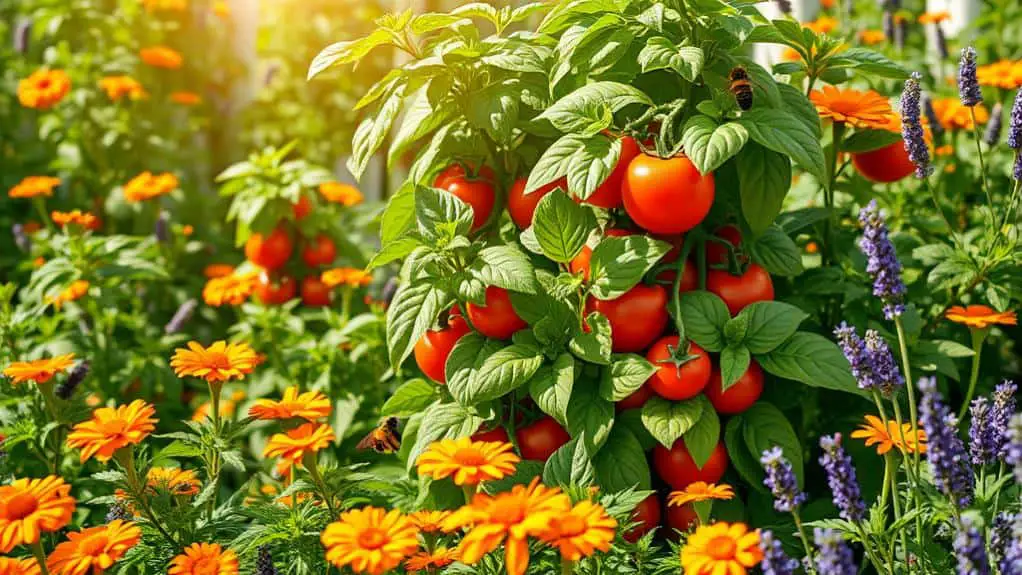
When it comes to growing herbs, understanding how to pair them based on the season can greatly enhance their growth and flavor.
Here are some seasonal pairing tips to keep your garden thriving:
- Summer: Pair basil with tomatoes for mutual benefits and natural pest control.
- Spring and Fall: Plant cilantro and parsley together, as they prefer similar temperatures and moisture levels.
- Winter: Combine thyme and rosemary; both are hardy, drought-tolerant, and can withstand colder temperatures.
- Fall: Sage and chives make great companions, thriving in well-drained soil and cooler temperatures.
Long-Term Herb Care
Caring for your herbs long-term is essential to maintaining a healthy and productive garden. Regular pruning encourages bushier growth and prevents overcrowding, which can lead to diseases. It's vital to monitor watering needs closely since different herbs have varying moisture requirements. Over or under-watering can harm plant health. Using organic compost or balanced fertilizers every few weeks during the growing season enhances their growth and aromatic qualities.
Here's a quick guide:
| Task | Frequency |
|---|---|
| Pruning | Regularly |
| Monitoring Watering | Closely |
| Fertilizing | Every few weeks |
Ensuring proper sunlight exposure and conducting regular pest monitoring are also key. By following these steps, your herbs will thrive and be good companions in your garden.
Frequently Asked Questions
Which Herbs to Plant Next to Each Other?
When deciding which herbs to plant next to each other, I always consider companion planting benefits. For example, basil boosts tomatoes' flavor and repels pests. Understanding herb growth patterns and aromatic herb combinations guarantees a thriving garden.
What Herbs Should Not Be Planted Close Together?
When looking at an herb compatibility chart, it's clear some herbs shouldn't be planted together. Mint, fennel, rue, sage, basil, dill, and catnip can have harmful herb interactions, undermining companion planting benefits. Keep them separate for best results.
What Herbs Should Be Mixed Together?
When considering herb companion planting, I recommend growing basil with parsley for flavor enhancement, and rosemary with sage for pest deterrence. Combining these herbs optimizes growth conditions, improves flavors, and naturally keeps unwanted insects at bay.
Do Any Herbs Not Go Together?
Yes, some herbs don't go together. Herb compatibility factors matter. For example, dill and cilantro clash due to pests, while mint's invasiveness requires separate planting. Companion planting benefits can turn into herb growth inhibitors if not planned well.
Conclusion
So, grab your gardening gloves and start pairing those herbs! With a little planning, you can create a thriving garden that's both beautiful and helpful. Remember to match basil with tomatoes, chives with carrots, dill with cucumbers, and rosemary with beans. These combinations will boost your plants' growth and keep pests away. Whether you're planting in the ground or in containers, these tips will set you on the path to a successful herb garden. Happy gardening!

